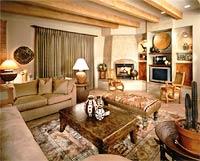You have good aesthetic sense and a flair for interior design.
Now all you need is the expertise to execute your creations.
Here's what it takes to turn your design dreams into a full-fledged career.
 Do I need formal training?
Do I need formal training?
i. Some formal education in the basic concepts of interior design is a must.
There are many schools that give you a background course. However, many of these are diploma courses that are elementary in terms of the knowledge and the skills they provide you with.
Either pursue a full-fledged course at a reputed institute in India or study abroad in a school with formal certifications. In India, there is as yet no accreditation for courses in interior design.
ii. The other option is to work with either a good firm or a well-established/ known designer.
Work with the best; work for free if you have to, because it will be worth it.
Do I freelance or work for a firm?
You can freelance at a later stage. Initially, you should gain experience by working with either a well-established firm or, alternately, with firms that provide considerable exposure and give you the freedom to show your capabilities.
Freelancing at an early stage can work to your disadvantage because, in India at least, most designers are not paid to conceptualise.
They are also expected to execute, for which you need hands-on experience.
How much can I earn?
This will depend on factors such as how talented a designer you are, work experience and exposure, contacts within the industry, business sense (if you want to do it on your own), your educational background and what kind of company you are working for (if you decide to join a firm).
Specialisation makes sense
It would be a smart move to specialise even as you are training. You can always diversify later; initially, it is a good idea to find a niche for yourself.
i. You may be interested only in residential interiors.
ii. If commercial spaces are your cup of tea, gain experience in such contracts.
iii. If you prefer to skip aspects like costing, execution, etc, then work for a firm where you can stick to designing only.
iv. If organisational skills are your forte, consider project management, which deals more with execution than design. Again, you would need to work for a firm.
Practice makes perfect
An eye for design can be turned into a professional skill if you practise at every given opportunity.
~ Read everything you can, observe design aspects wherever you go, make mental notes and, if possible, keep a journal to note down the points you pick up along the way.
~ Use your home and any space that is offered to you as a guinea pig.
~ There's no substitute for hands-on experience, so start as early as possible. If you aren't paid for it, don't worry; learn all you can and explore every opportunity to test your know-how.
Build your portfolio
Create a portfolio that will showcase your work.
Try to do different kinds of projects. It will teach you all you need to know firsthand and also work as a showcase for your talent.
Interior design or decor is about space planning, conceptual genius and a lot of hard work.
Other skills besides design
What to succeed as an independent designer? Then be ready to pick up a whole lot of non-design skills.
You will have to learn planning and time-management skills, labour management, client handling, costing analyses and how to execute your designs.
i. Develop business skills
You need fundamental business skills. A management course is a good idea, but not always necessary if you can learn those skills while you work for someone.
ii. Expand your network
Research every aspect of your trade.
Once you are familiar with different styles, concepts in flooring, wall coverings, soft furnishings, accessories and art, you must find the suppliers who will actually deliver the goods. Understand the products even as you build your relationship with the suppliers.
Create your own team of skillers workers like carpenters, floor layers, electricians, etc.
These networks that you create will be your backbone. They can get you better deals, which means you can offer clients a better deal. This is how the new kid on the block gets business.
iii. Deal with clients
When you meet clients, you will find that your biggest asset is not your ability to design; it is your ability to LISTEN!
Understand your client. Find out their needs. Determine their lifestyle. Discover their likes and dislikes. It may not necessarily coincide with what you would instinctively recommend.
This process will leave you with two choices. Find a point of convergence between their needs and your ideas and incorporate as much of their wants as possible into your presentation. If you find no meeting ground, you are better off recommending someone rather than working on a project where you will derive no satisfaction and the client will offer no appreciation.
At the end of the day, your designing style and their requirements have to meet halfway for the project to be a worthwhile enterprise.
What makes a good interior designer?
If your creative genius can be coupled with practical ability, you are well on your way to becoming a successful interior designer. These tips should help:
~ Integrate modern and traditional concepts and styles.
~ Know your field. Know your client. Never presume to be bigger than either of them.
~ Never stop learning, never stop listening.
~ Innovate. Don't get trapped into predictable design.
~ Never underestimate the value of good service. It tends to pay higher dividends than a great design.
~ Work constantly on your time management, scheduling, planning and execution skills.
~ Develop coordination skills; learn how to be a team worker.
~ Inculcate business expertise. Do an MBA if you have to, but get your business concepts right.
~ Be patient when you deal with your clients, suppliers and workforce.
~ Develop an eye for detail and design skills.
~ Strengthen your design skills.
~ You need to have a sense of style.
~ Keep abreast of the latest trends. Information keeps you 10 steps ahead.
~ Understand different decorating styles, their uses and limitations.
A list of design schools
In alphabetical order:
Arch Institute Of Fashion And Design
D-103 /C, Lalkothi Marg
Bapu Nagar (Sewar Area)
Jaipur, Rajasthan
Phones:
- (0141) 2708961
- (0) 9314515026
Web Site : www.archedu.org
***
Birla Institute Of Liberal Arts And Management Sciences
5-A Sarat Bose Road
Opposite Minto Park
Kolkata -- 700 020
Phones: (033) 22404558, 22471271
Web site: www.bilams.com
***
Creations -- The School Of Design And Technology, Pune
826, Shukrawar Peth
Gadikhana Chowk, Pune
Web site: www.creationsindia.com
***
Indian Institute Of Technology -- Bombay
Powai
Mumbai -- 400076
Phone: (022) 25722545
Web site: www.iitb.ac.in
***
National Institute of Fashion Design
NIFD Campus,
2-B, Madhya Marg
Sector 27
Chandigarh -- 160 019
Phones: (0172) 2784 980/81
Web site: www.nifd.net
***
JJ School of Arts
Dr D N Road
Fort Mumbai -- 400 001
Phone: (022) 22621652
***
IITC
102 Richmond Road
Bangalore -- 560 025
Phones: (080) 22219497, 22229073
***
Rachna Sansad, School Of Interior Design
278, Shankar Ghanekar Marg
Prabhadevi
Mumbai -- 400 025
***
School Of Interior Design
Centre for Environmental Planning Technology
Kasturbhai Lalbhai Campus
University Road, Navrangpura
Ahmedabad -- 380 009
Phone: (079) 630 6652
Web site: www.cept.ac.in
***
School of Interior Design
6/3, First Main Road, Vasanthnagar
Bangalore -- 560 052
***
St Francis Institute of Art and Design
Mt Poinsur, Borvili West
SVP Road
Mumbai -- 400 103
Phone: (022) 28936302
Web site: www.sfartinstitute.com
Rekha I Nambiar is an interior designer and manufacturer of home furnishings and furniture. She is based in New Delhi.








More from rediff